
views
Diary Supplies

Decide what sort of diary you want. There are plenty of options for keeping a diary – you don’t need to stick with just a paper version. You can keep a traditional paper diary, but you can also use a website or blog that is private and password protected. You can also simply use a document on your computer. Paper notebooks give you total control and privacy, but you won’t have a backup option unless you make copies. Keep in mind that anything you store online is susceptible to hacking, so even if your online diary is password protected or private, there’s always a chance someone could get in.

Choose a paper diary. If you choose to keep a paper diary, you’ll need to actually purchase a diary. You can use any paper notebook as a diary, even something as simple as a one subject spiral notebook or a composition notebook. But you can also go a little bit fancier and choose a leather bound notebook or a notebook with thicker, higher quality paper. Some great options for paper diaries include the 'Leuchtturm' 1917 notebook, Moleskin notebooks, or Whitelines notebooks. Most stores have a notebook section – browse the shelves and see if anything pops out at you. If you don’t love your diary, you probably won’t write in it. To increase the security of a paper diary, you can purchase one with a lock on it. Just make sure you keep the key in a secure place.

Purchase your writing instrument. You have a lot to choose from when it comes to selecting what you’ll use for writing in your diary. You can use a regular ballpoint pen or a pencil, including those you might have at home. You can also mix it up with colored pens, fountain pens, and even colored pencils and markers. The more you enjoy what you’re writing with, the more likely you’ll write regularly.
Writing Schedule
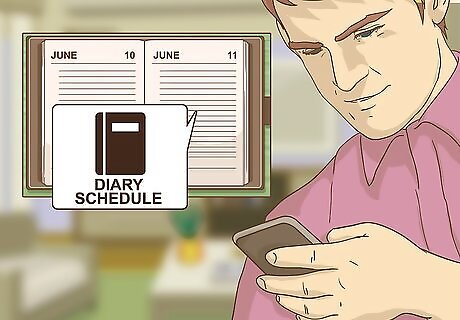
Create a schedule. If you want to ensure that you write every day, schedule specific writing time. Maybe you’ll like to write first thing in the morning about the day before, or maybe writing in your diary at the end of the day is a good way for you to decompress. When you write is not as important as making sure that you write every day. To make sure you stick to your writing schedule, you can use a smartphone, your watch, or your computer to set a reminder to write every day at the same time.

Set time limits for your writing. On some days you might find it hard to write and other days you might have so much to say you feel like you could write all day. Setting a time limit can give your writing structure and make it easier to turn into a daily routine. Start with ten to fifteen minutes per day. If you find you are always running out of time, you can always increase the amount of time you spend writing. Setting a timer can help you write within the time limit without having to check your watch every few minutes.

Choose a writing location. Writing in the same location every day can help you stay committed to writing regularly. If you’re going to the same location every day to write, it will create a pattern and give your writing even more structure. It doesn’t matter where you write – it can be at a coffee shop or a room in your home – as long as you always write in the same place. Take things further. If you are writing at home, sit in the same armchair or at the same table each time.

Don’t give up if you get off track. It can be easy to give up on keeping your diary if you put too much pressure on yourself. It’s okay if you occasionally skip a day or two – once you get back into writing, simply jot down short summaries of the days you missed.
Content Ideas

Start with a quote or a poem. Sitting in front of a brand-new, blank diary can be a little bit intimidating. If you find yourself stuck, start by writing down one of your favorite quotes or poems. This can help you feel inspired and also takes the pressure off of you to write the first entry in your diary. You can also copy down new poems or quotes as you go.
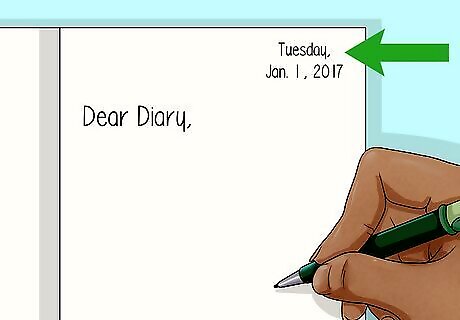
Date your entries. Make sure you date every entry you make in your diary. This can be useful if you’re trying to remember when a specific event happened or just to see how your writing – and therefore your life – have evolved over time. How you date the entries is up to you. If you want to get fancy, write out the full date, like: July 14, 2018. If you want to keep things simpler, try: 7/14/2018 or 7/14/18. If you plan on keeping multiple journals, one for each year, you can write 7/14.
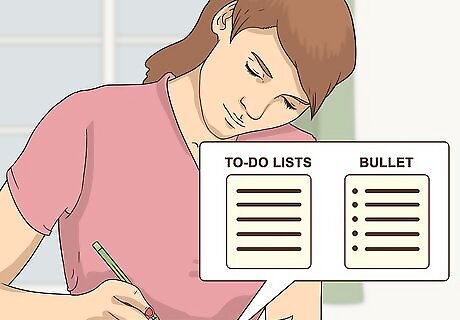
Mix up your entry formats. Once you begin writing in your diary, don’t feel like you have to commit to one particular type of entry all the way through your diary. Your diary should be a place for you to record your thoughts, and your thoughts might take different forms on different days. Try some of the following: Traditional paragraph-like entries To-do lists Drawing Poetry Stories

Write short entries. You don’t need to write pages and pages every time you sit down to write in your diary. One paragraph that sums up your day is plenty, especially when you first start writing. You don't always have to write short entries, however. Sometimes you'll find you have a lot to say about your day or something in particular that happened. It's okay to write long entries in those cases.

Try the same prompt if you get stuck. Some days you might have so much - or so little - on your mind that it’s hard to even know where to begin. Try by writing “So right now, I’m…” and just write down whatever comes to your mind first. This can be a great way to get started and you might find that the words flow a lot more easily after that. Look online for "writing prompts." The internet is a great resource for these type of thing.
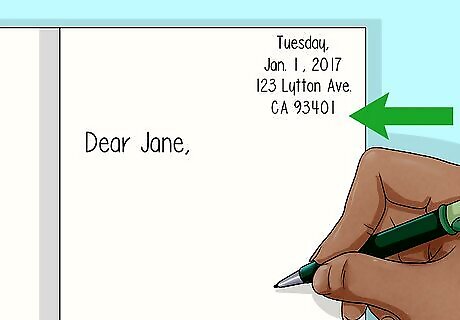
Write to others. Sometimes you might wish you could say certain things to certain people. Maybe it’s someone you can’t or don’t talk to anymore, or maybe it’s someone you don’t see regularly. Maybe there are things you need to tell yourself. Using a diary entry to write to other people can bring you closure and help you work out your feelings. If you're not quite sure how to start this type of entry, simply format it as if you're actually writing a letter, with the date and address of the person you're writing to at the top.
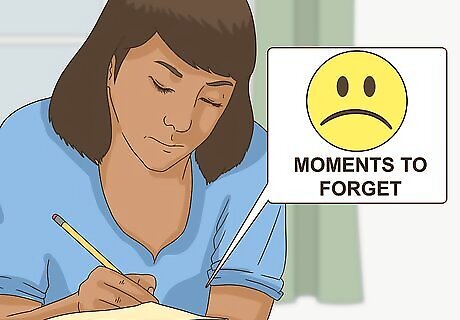
Write about something you want to forget. This sounds counterintuitive, but if there’s an event you’d like to forget, it might actually help to write it down. Once you get it out of your head and onto paper, your brain might not hold so tightly to it. For example, let's say something really embarrassing happened to you at school or work. Writing down all the details helps you get them all out of your head, and might prevent you from reliving the event over and over.

Record what you’re grateful for. A great way to add to your daily entries is to list the things that you’re grateful for that day. It also helps you keep track of the good things in your life. These can be as simple as “the sun was shining” or as detailed as a conversation that you had with a friend.

Be open and honest. The best part of keeping a diary is that you can be brutally honest in it without having to worry about being judged. You can write down your deepest fears and biggest secrets without worrying that your diary is going to tell someone else. If you feel like you have to edit yourself, you might be less likely to use the diary, so staying open is key.




















Comments
0 comment